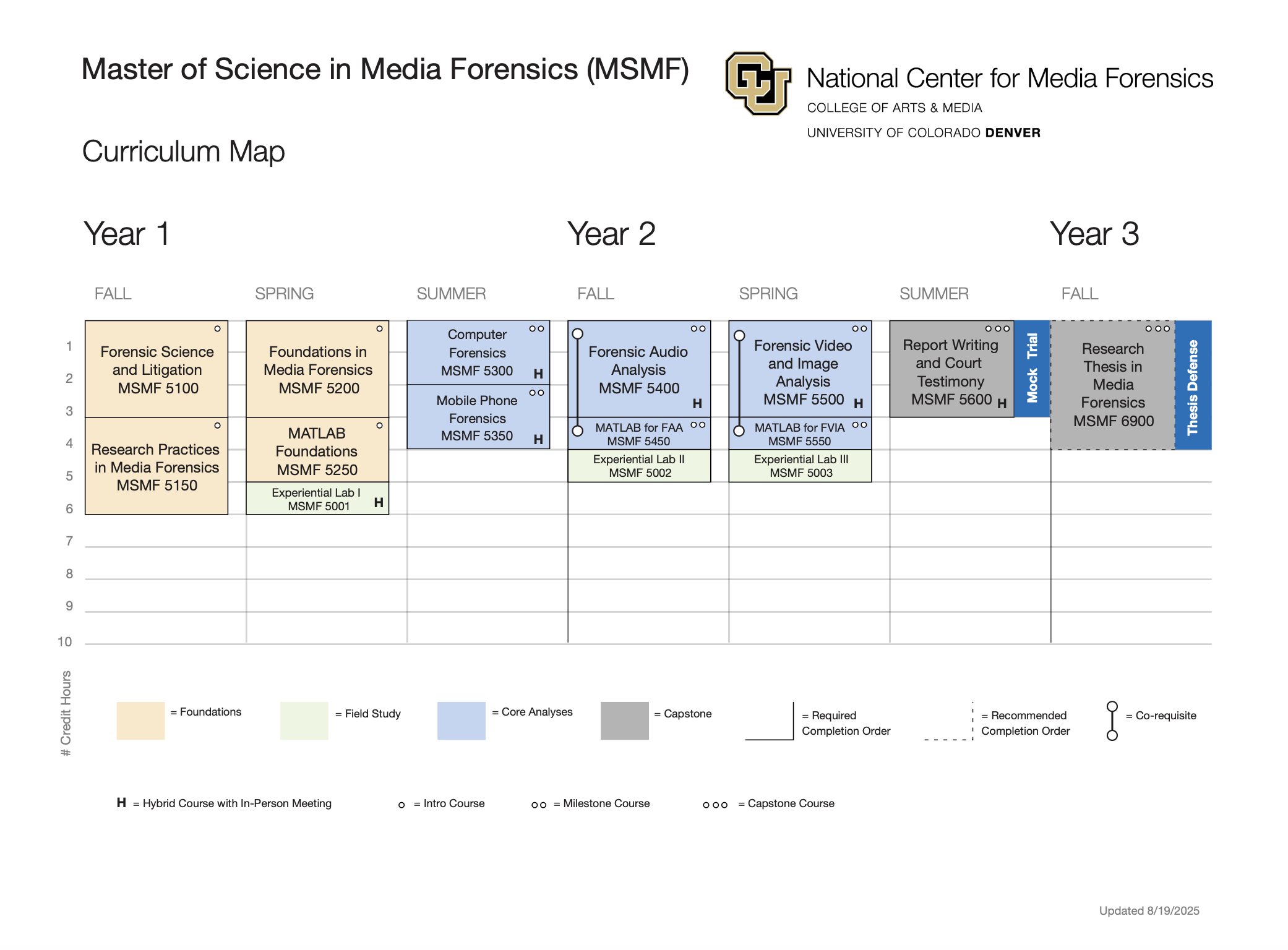Master of Science in Media Forensics Degree
CURRICULUM
This course of study allows students to complete the MSMF degree in a minimum of two and a half years. The curriculum follows a prescribed sequence of foundational, core analysis, and field study courses. Applicants will enroll in the prescribed series of courses with their cohort.

IN-PERSON/TRAVEL REQUIREMENTS
The table below outlines the estimated timing for each in-person session, where travel is required. (Subject to change.):
NCMF faculty work to communicate each semesters’ required in-person meeting dates well in advance so students can make any necessary work or personal arrangements. Travel costs for each of the in-person sessions are the responsibility of the student.
COURSE DESCRIPTIONS
MSMF 5100 Forensic Science and Litigation (Online)
Critical analysis of legal precedent and court proceedings reveal to students the correlation between science and law in the litigation of forensic evidence. Assigned reading and research papers regarding evidence admissibility and scientific methodology will prepare students for evidence examination.
MSMF 5150 Research Practices in Media Forensics (Online)
An introduction to practical research techniques and forensic science periodicals provides students with a foundation for projects and reports in subsequent classes and for the research thesis. Library resources, research design, writing styles, and information technology will be discussed.
MSMF 5200 Foundations in Media Forensics (Online)
Students learn the foundational processes integral to forensic audio, video, and image analysis demonstrating knowledge through reading responses and documentation of procedures and methodology used in assigned projects. Topics include: media recording technology, analog/digital theory, multimedia compression, and equipment characterization.
MSMF 5250 MATLAB Foundations (Online)
An introduction to MATLAB workflow and its use in Media Forensics will be explored. Students will learn how to build program commands in scripts for signal analysis and to display graphical representations of data and statistics.
MSMF 5001 Experiential Lab I (Hybrid)
Students will understand research practices, the application of audio and video technology in the field, and multimedia analysis through professional conferences and/or site visits to crime labs and government agencies. Students will respond to experiences via presentation, demonstration, and discussion.
MSMF 5300 Computer Forensics (Hybrid)
Students explore computer forensics through guided projects and group discussion. An overview of computer hardware/software and characterization of storage media and file types will be covered through mock evidence examination documenting the search, seizure, and acquisition of forensic media.
MSMF 5350 Mobile Phone Forensics (Hybrid)
Students learn concepts regarding the proper handling of mobile phones to ensure evidence integrity and approaches to address the ever-changing field. Students are prepared for the acquisition and analysis of forensic media on personal devices through exercises and group projects.
MSMF 5400 Forensic Audio Analysis (Hybrid)
Students learn concepts through the application of techniques related to audio enhancement, digital media authentication, acoustic analysis, and automatic speaker recognition. The acquisition and analysis of digital evidence applying reliable methods prepares students for forensic audio analysis in the laboratory.
MSMF 5450 MATLAB for Forensic Audio Analysis (Online)
Advanced application of MATLAB for the forensic analysis of audio will be presented including file access, FFT and waveform plotting, and signal detection. Through the exploration of correlation and using mean quadratic difference students will be prepared for media authentication.
MSMF 5002 Experiential Lab II (Online)
Students will understand laboratory procedures and the application of audio technology and forensic analysis through technical assignments and report writing. Students will use a mixture of freeware and open-source software, industry standard lab software, and personal computers to complete assignments.
MSMF 5500 Forensic Video and Image Analysis (Hybrid)
Students learn concepts through the application of techniques related to forensic video collection and image enhancement, authentication, photogrammetry, and comparison. The acquisition and analysis of digital evidence applying reliable methods prepares students for working on forensic imagery in the laboratory.
MSMF 5550 MATLAB for Forensic Video and Image Analysis (Online)
Advanced application of MATLAB for the forensic analysis of images will be presented covering image processing and analysis techniques. Through exploring analyses such as Photo Response Non-Uniformity and the Bi-Dimensional DFT, students are prepared for image authenticity examinations.
MSMF 5003 Experiential Lab III (Online)
Students will understand laboratory procedures and the application of video technology and forensic analysis through technical assignments and report writing. Students will also begin work developing thesis topics. Students will use a mixture of freeware and open-source software, industry standard lab software, and personal computers to complete assignments.
MSMF 5600 Report Writing and Court Testimony (Hybrid)
Students are prepared for expert witness testimony through the analysis of mock evidence, complimentary report preparation, and subsequent mock trial. This capstone experience will demonstrate a student’s technical writing and presentation skills and exercise the creation of demonstrative materials.
MSMF 6900 Research Thesis in Media Forensics
Students work closely with their thesis advisor in selecting a topic for original research and scientific publication. This capstone project creates an area of specialty for MSMF degree candidates. Approved materials are evaluated through report submission and oral defense.